Charles E W Bean, Diaries, AWM38 3DRL 606/269/1 - 1918 - 1936 - Part 8
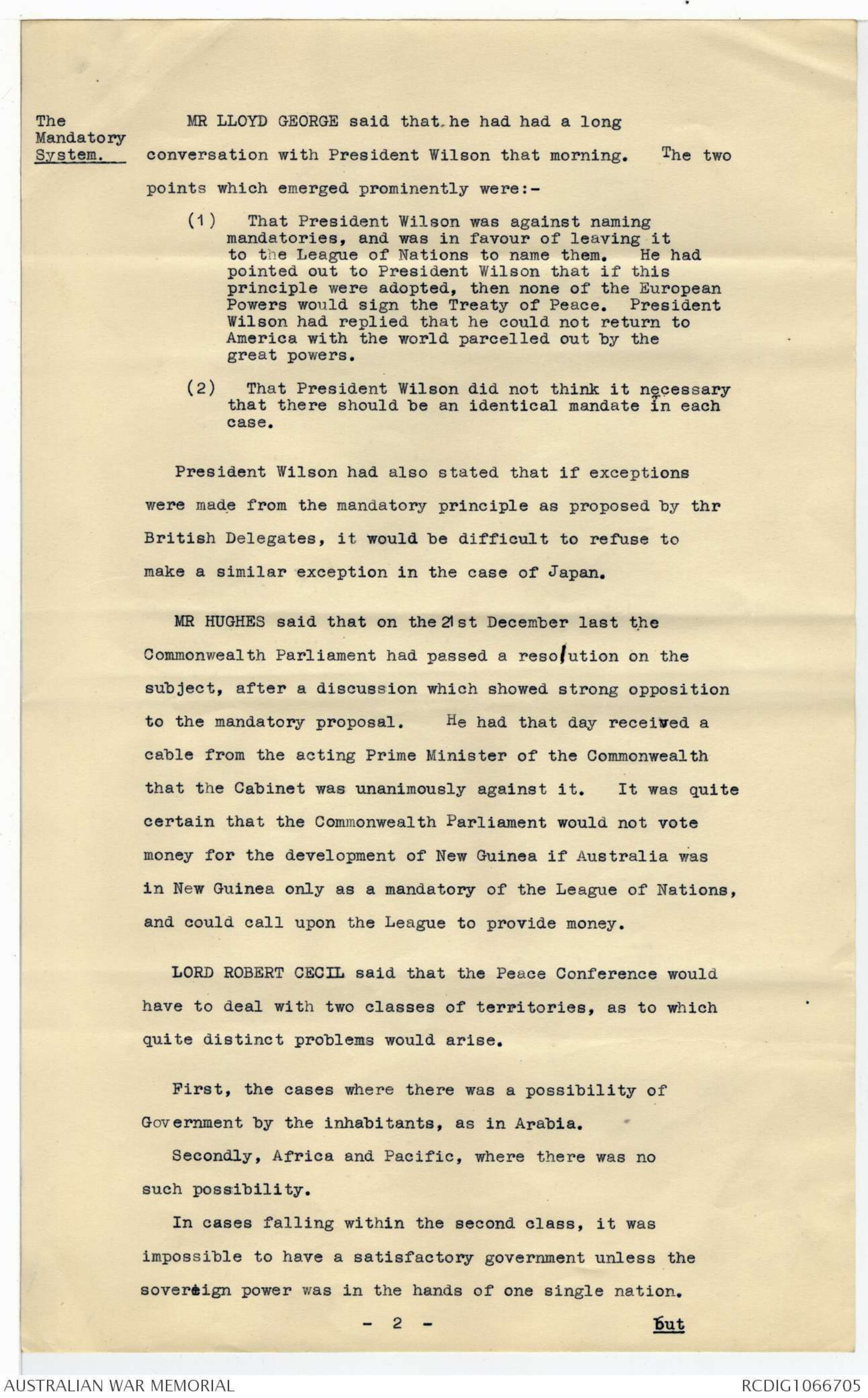
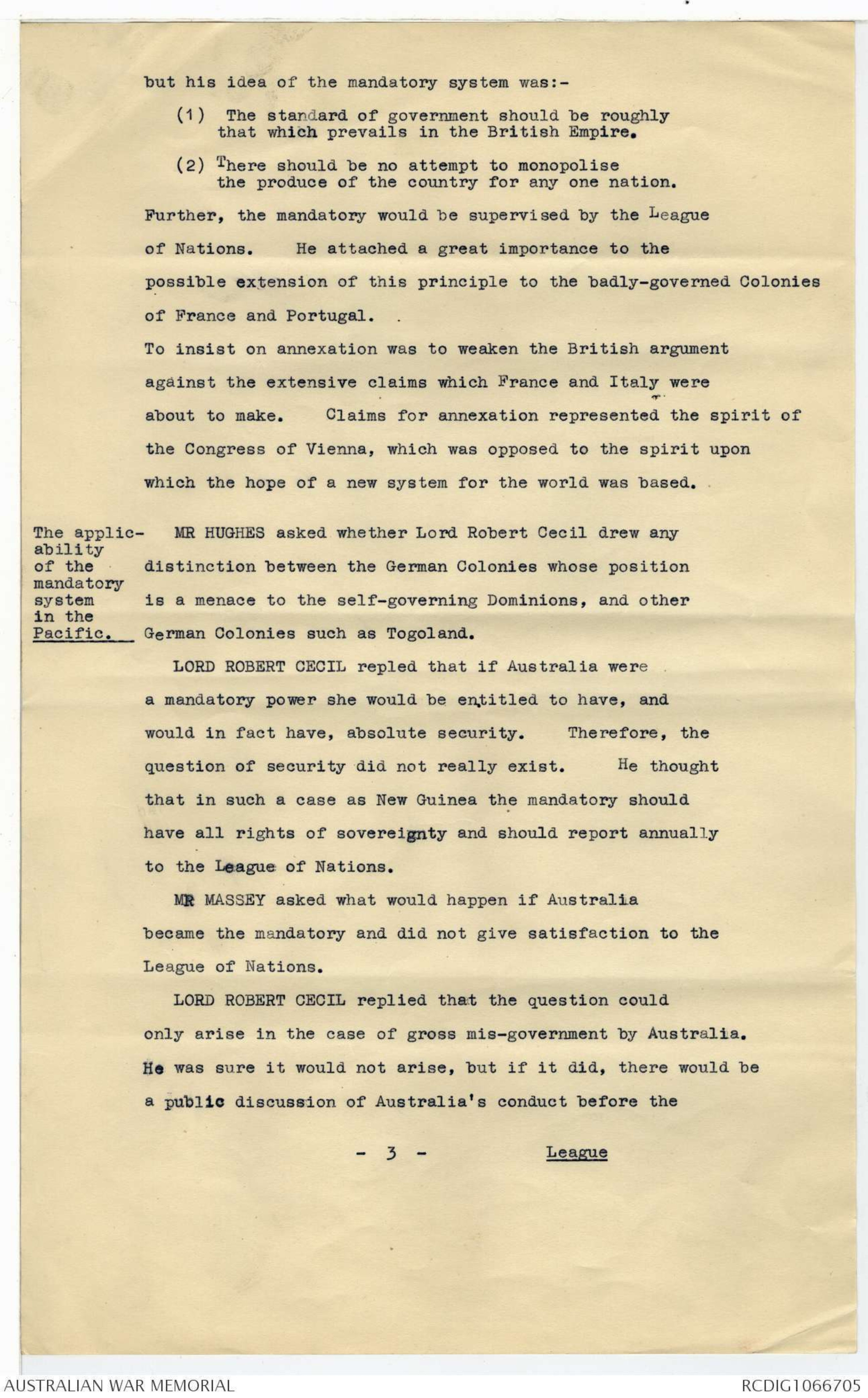
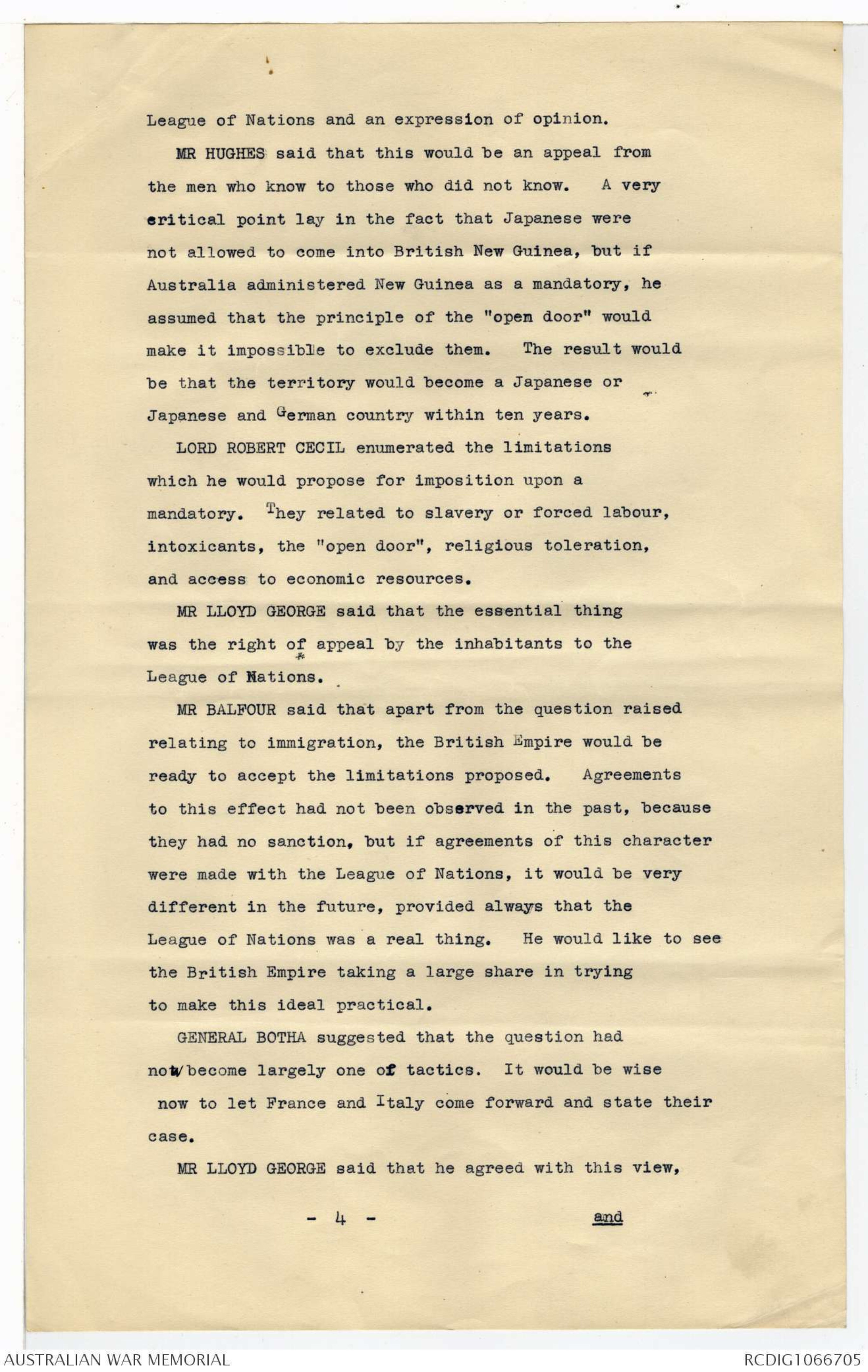
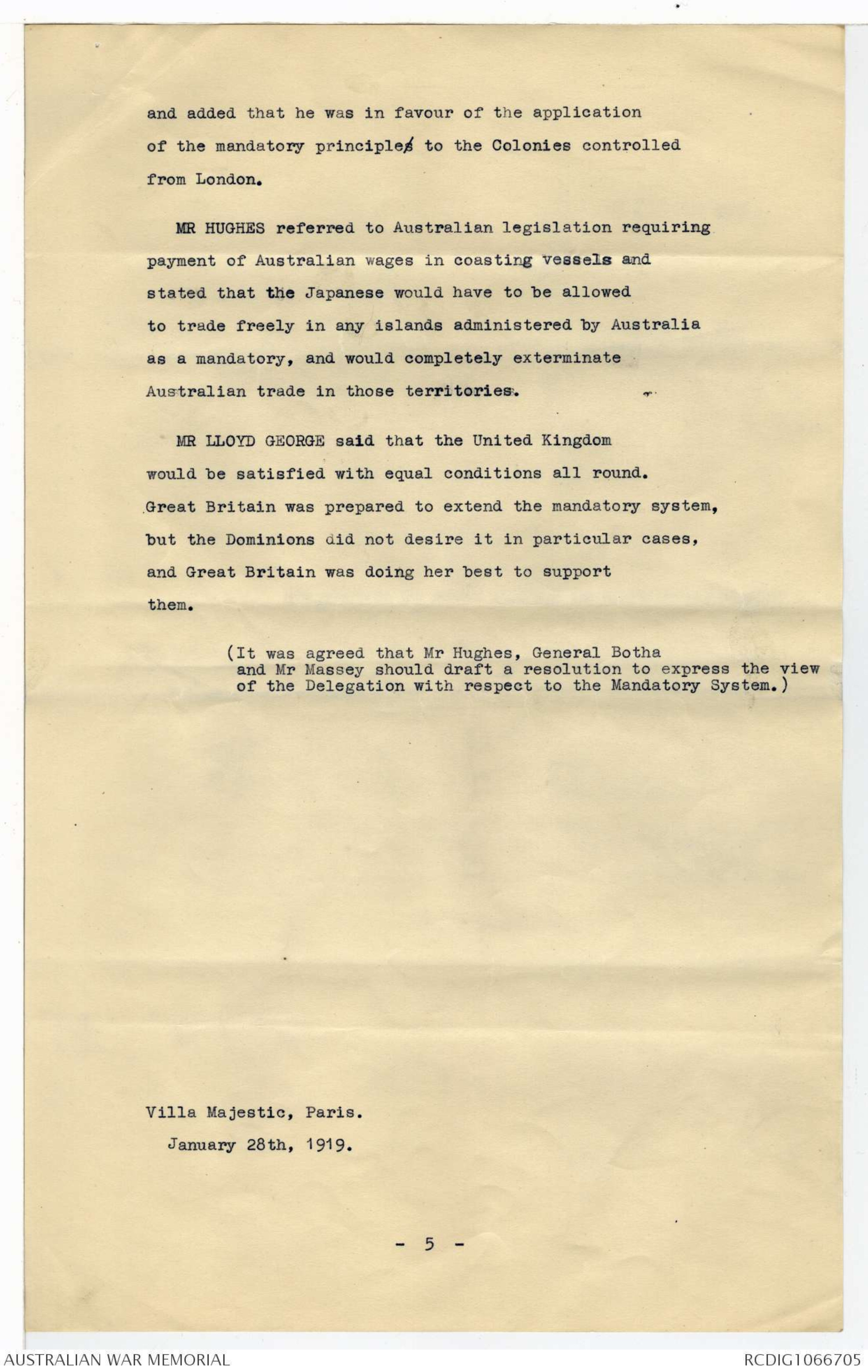
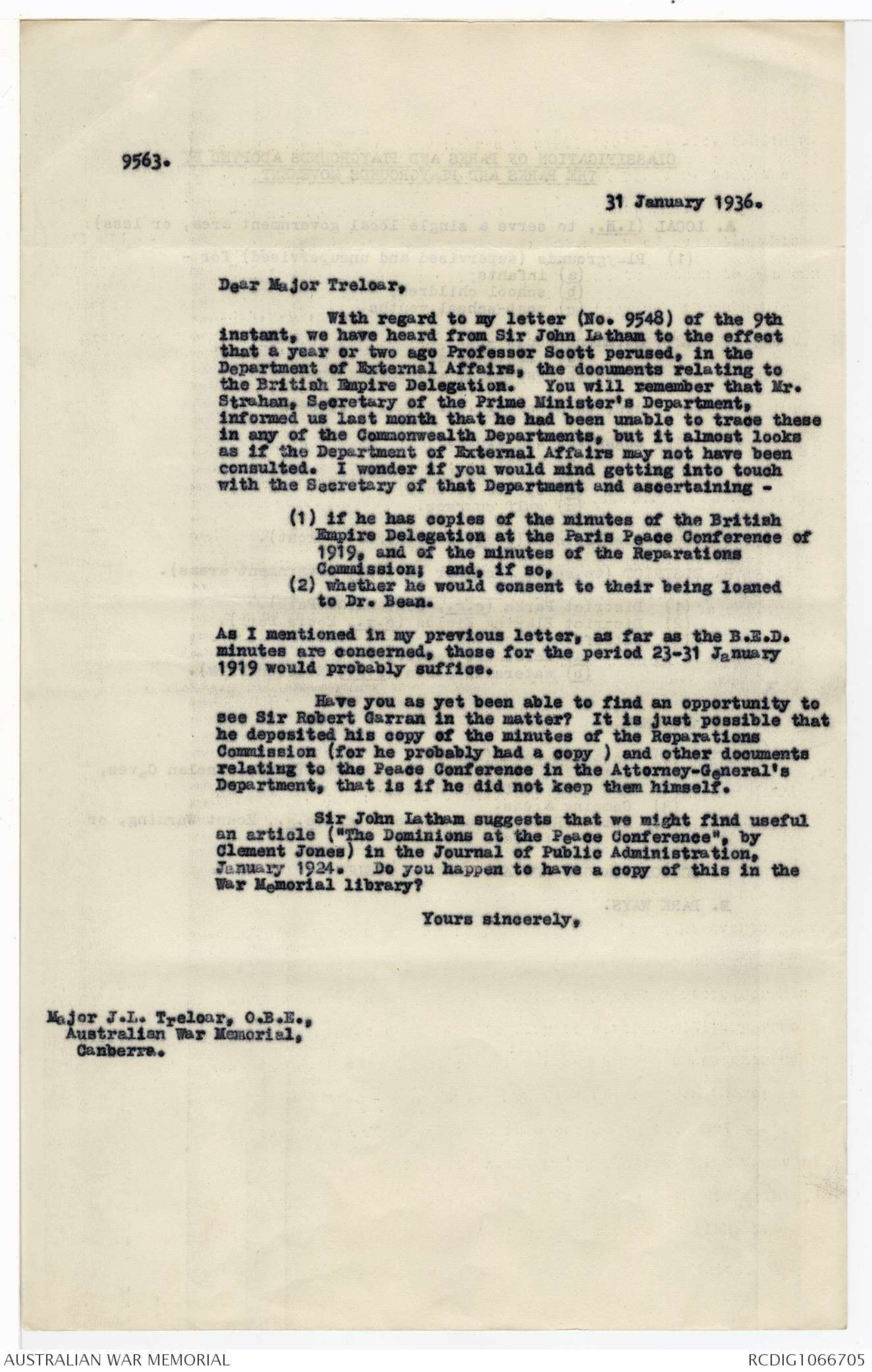
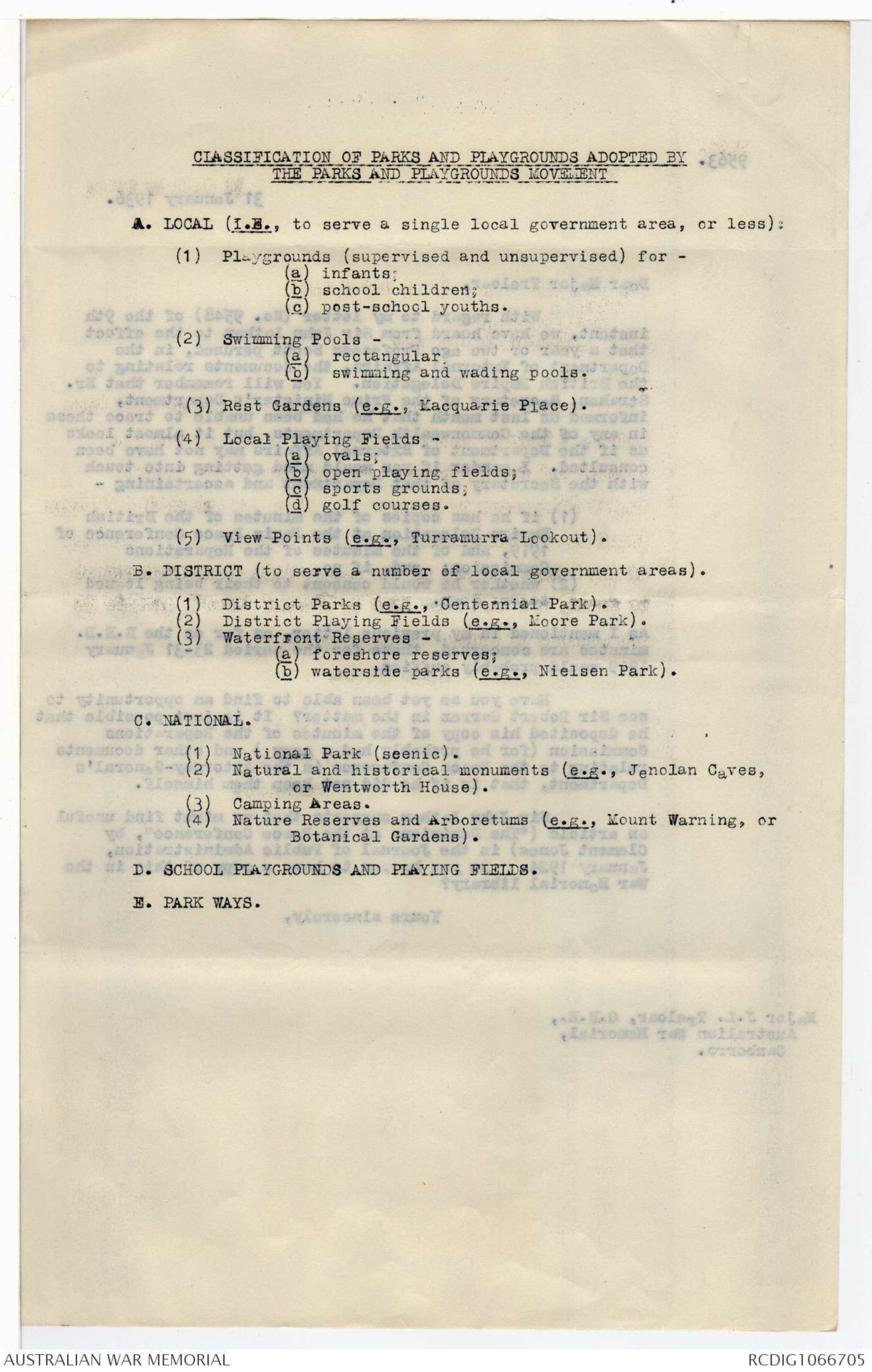
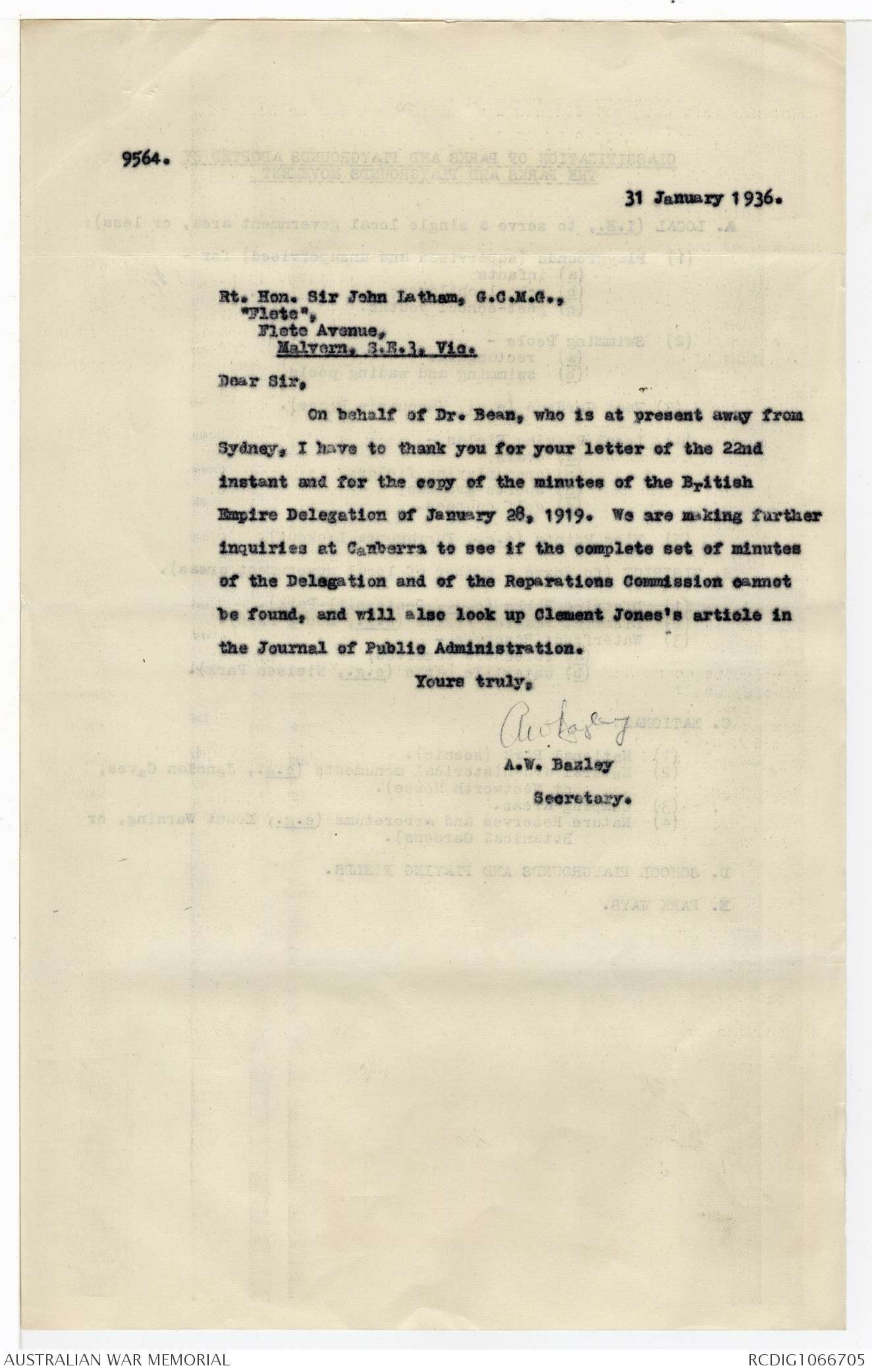
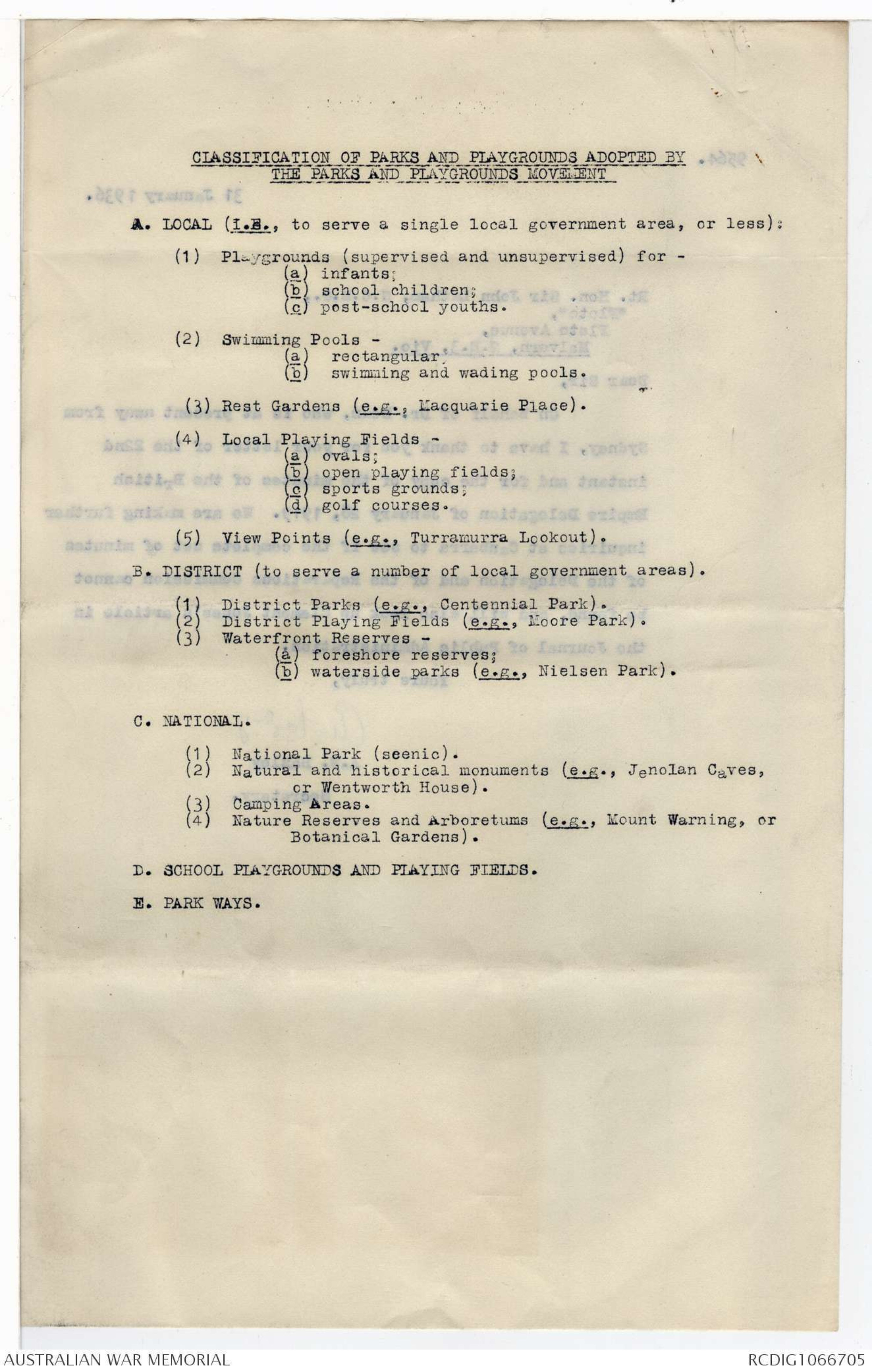
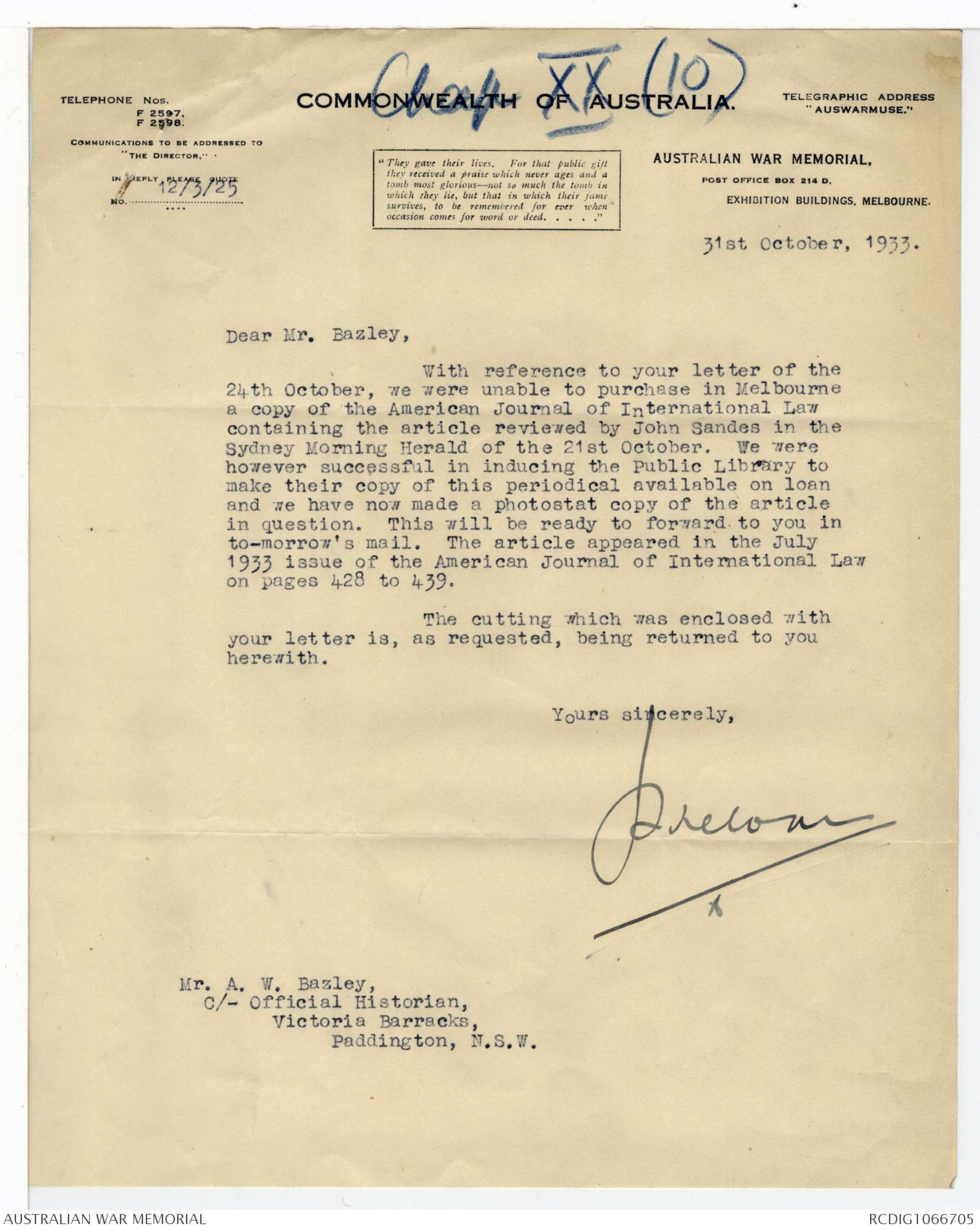
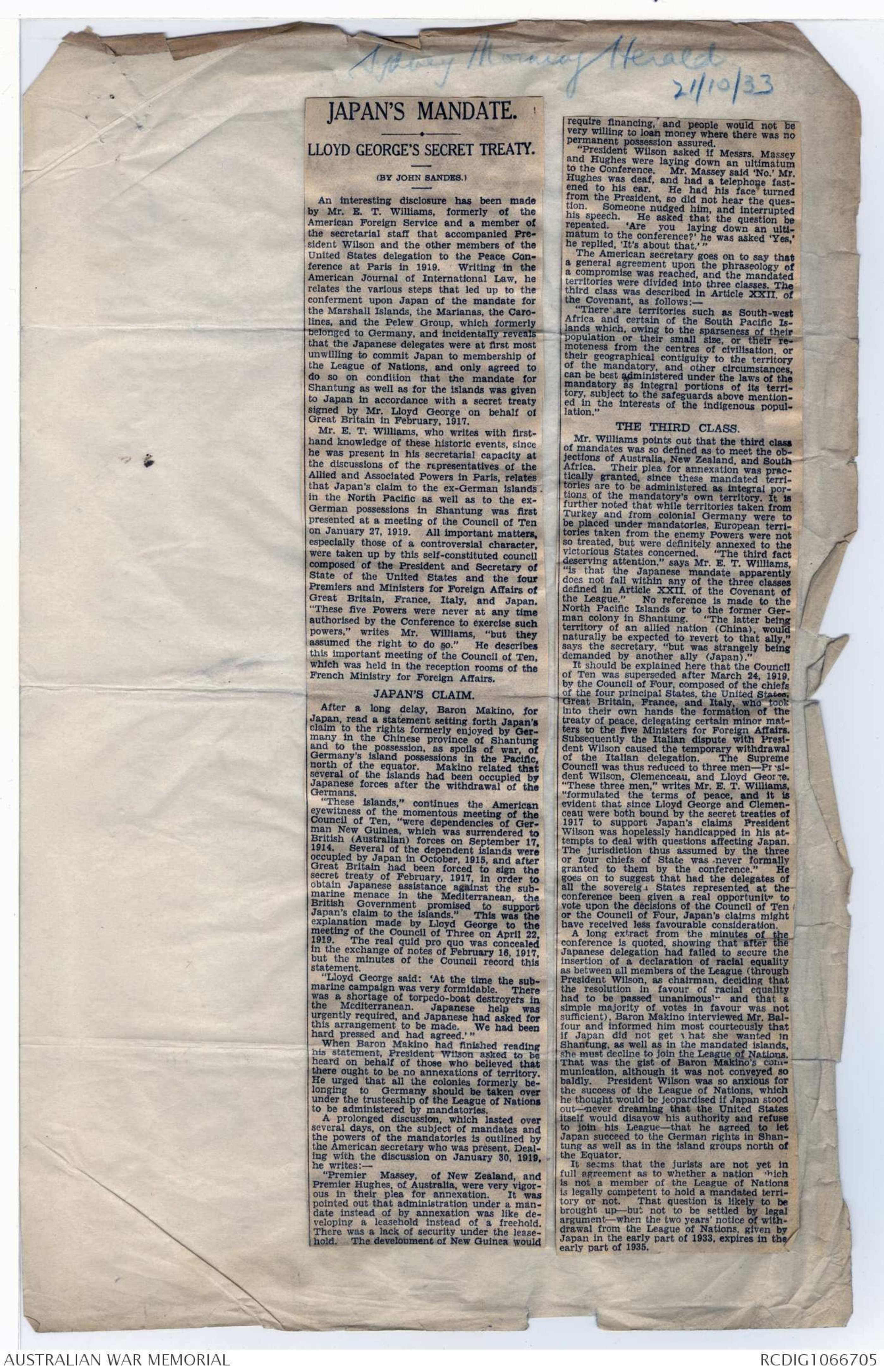
The
Mandatory
System.
MR LLOYD GEORGE said that he had had a long
conversation with President Wilson that morning. The two
points which emerged prominently were :-
(1) That President Wilson was against naming
mandatories, and was in favour of leaving it
to the League of Nations to name them. He had
pointed out to President Wilson that if this
principle were adopted, then none of the European
Powers would sign the Treaty of Peace. President
Wilson had replied that he could not return to
America with the world parcelled out by the
great powers.
(2) That President Wilson did not think it necessary
that there should be an identical mandate in each
case.
President Wilson had also stated that if exceptions
were made from the mandatory principle as proposed by thr
British Delegates, it would be difficult to refuse to
make a similar exception in the case of Japan.
MR HUGHES said that on the 21st December last the
Commonwealth Parliament had passed a resolution on the
subject, after a discussion which showed strong opposition
to the mandatory proposal. He had that day received a
cable from the acting Prime Minister of the Commonwealth
that the Cabinet was unanimously against it. It was quite
certain that the Commonwealth Parliament would not vote
money for the development of New Guinea if Australia was
in New Guinea only as a mandatory of the League of Nations,
and could call upon the League to provide money.
LORD ROBERT CECIL said that the Peace Conference would
have to deal with two classes of territories, as to which
quite distinct problems would arise.
First, the cases where there was a possibility of
Government by the inhabitants, as in Arabia.
Secondly, Africa and Pacific, where there was no
such possibility.
In cases falling within the second class, it was
impossible to have a satisfactory government unless the
sovereign power was in the hands of one single nation.
-2-
but
but his idea of the mandatory system was :-
(1) The standard of government should be roughly
that which prevails in the British Empire.
(2) There should be no attempt to monopolise
the produce of the country for any one nation.
Further, the mandatory would be supervised by the League
of Nations. He attached a great importance to the
possible extension of this principle to the badly-governed Colonies
of France and Portugal.
To insist on annexation was to weaken the British argument
against the extensive claims which France and Italy were
about to make. Claims for annexation represented the spirit of
the Congress of Vienna, which was opposed to the spirit upon
which the hope of a new system for the world was based.
[*The applicability
of the
mandatory
system
in the
Pacific*]
MR HUGHES asked whether Lord Robert Cecil drew any
distinction between the German Colonies whose position
is a menace to the self-governing Dominions, and other
German Colonies such as Togoland.
LORD ROBERT CECIL replied that if Australia were
a mandatory power she would be entitled to have, and
would in fact have, absolute security. Therefore, the
question of security did not really exist. He thought
that in such a case as New Guinea the mandatory should
have all rights of sovereignty and should report annually
to the League of Nations.
MR MASSEY asked what would happen if Australia
became the mandatory and did not give satisfaction to the
League of Nations.
LORD ROBERT CECIL replied that the question could
only arise in the case of gross mis-government by Australia.
He was sure it would not arise, but if it did, there would be
a public discussion of Australia's conduct before the
-3-
League
League of Nations and an expression of opinion.
MR HUGHES said that this would be an appeal from
the men who know to those who did not know. A very
critical point lay in the fact that Japanese were
not allowed to come into British New Guinea, but if
Australia administered New Guinea as a mandatory, he
assumed that the principle of the "open door" would
make it impossible to exclude them. The result would
be that the territory would become a Japanese or
Japanese and German country within ten years.
LORD ROBERT CECIL enumerated the limitations
which he would propose for imposition upon a
mandatory. They related to slavery or forced labour,
intoxicants, the "open door", religious toleration,
and access to economic resources.
MR LLOYD GEORGE said that the essential thing
was the right of appeal by the inhabitants to the
League of Nations.
MR BALFOUR said that apart from the question raised
relating to immigration, the British Empire would be
ready to accept the limitations proposed. Agreements
to this effect had not been observed in the past, because
they had no sanction, but if agreements of this character
were made with the League of Nations, it would be very
different in the future, provided always that the
League of Nations was a real thing. He would like to see
the British Empire taking a large share in trying
to make this ideal practical.
GENERAL BOTHA suggested that the question had
now become largely one of tactics. It would be wise
now to let France and Italy come forward and state their
case.
MR LLOYD GEORGE said that he agreed with this view,
-4-
and
and added that he was in favour of the application
of the mandatory principles to the Colonies controlled
from London.
MR HUGHES referred to Australian legislation requiring
payment of Australian wages in coasting vessels and
stated that the Japanese would have to be allowed
to trade freely in any islands administered by Australia
as a mandatory, and would completely exterminate
Australian trade in those territories.
MR LLOYD GEORGE said that the United Kingdom
would be satisfied with equal conditions all round.
Great Britain was prepared to extend the mandatory system,
but the Dominions did not desire it in particular cases,
and Great Britain was doing her best to support
them.
(It was agreed that Mr Hughes, General Botha
and Mr Massey should draft a resolution to express the view
of the Delegation with respect to the Mandatory System.)
Villa Majestic, Paris.
January 28th, 1919.
-5-
9563.
31 January 1936.
Dear Major Treloar,
With regard to my letter (No. 9548) of the 9th
instant, we have heard from Sir John Latham to the effect
that a year or two ago Professor Scott perused, in the
Department of External Affairs, the documents relating to
the British Empire Delegation. You will remember that Mr.
Strahan, Secretary of the Prime Minister's Department,
informed us last month that he had been unable to trace these
in any of the Commonwealth Departments, but it almost looks
as if the Department of External Affairs may not have been
consulted. I wonder if you would mind getting into touch
with the Secretary of that Department and ascertaining -
(1) if he has copies of the minutes of the British
Empire Delegation at the Paris Peace Conference of
1919, and of the minutes of the Reparations
Commission; and, if so,
(2) whether he would consent to their being loaned
to Dr. Bean.
As I mentioned in my previous letter, as far as the B.E.D.
minutes are concerned, those for the period 23-31 January
1919 would probably suffice.
Have you as yet been able to find an opportunity to
see Sir Robert Garran in the matter? It is just possible that
he deposited his copy of the minutes of the Reparations
Commission (for he probably had a copy ) and other documents
relating to the Peace Conference in the Attorney-General's
Department, that is if he did not keep them himself.
Sir John Latham suggests that we might find useful
an article ("The Dominions at the Peace Conference", by
Clement Jones) in the Journal of Public Administration,
January 1924. Do you happen to have a copy of this in the
War Memorial library?
Yours sincerely,
Major J.L. Treloar, O.B.E.
Australian War Memorial,
Canberra.
CLASSIFICATION OF PARKS AND PLAYGROUNDS ADOPTED BY
THE PARKS AND PLAYGROUNDS MOVEMENT
A. LOCAL (I.E., to serve a single local government area, or less):
(1) Playgrounds (supervised and unsupervised) for -
(a)infants;
(b)school children;
(c) post-school youths.
(2) Swimming Pools -
(a)rectangular
(b)swimming and wading pools.
(3) Rest Gardens (e.g., Macquarie Place).
(4) Local Playing Fields
(a) ovals,
(b) open playing fields;
(c) sports grounds;
(d) golf courses.
(5) View Points (e.g., Turramurra Lookout).
B. DISTRICT (to serve a number of local government areas).
(1) District Parks (e.g., Centennial Park).
(2) District Playing Fields (e.g., Moore Park).
(3) Waterfront Reserves -
(a) foreshore reserves:
b) waterside parks (e.g., Nielsen Park).
C. NATIONAL.
(1) National Park (scenic).
(2) Natural and historical monuments (e.g., Jenolan Caves,
or Wentworth House).
(3) Camping Areas.
(a) Nature Reserves and Arboretums
(e.g., Mount Warning, or
Botanical Gardens).
D. SCHOOL PLAYGROUNDS AND PLAYING FIELDS.
E. PARK WAYS.
9564.
31 January 1936.
Rt. Hon. Sir John Latham, G.C.M.G.,
"Flete",
Flete Avenue,
Malvern, S.E.3, Vic.
Dear Sir,
On behalf of Dr. Bean, who is at present away from
Sydney, I have to thank you for your letter of the 22nd
instant and for the copy of the minutes of the British
Empire Delegation of January 28, 1919. We are making further
inquiries at Canberra to see if the complete set of minutes
of the Delegation and of the Reparations Commission cannot
be found, and will also look up Clement Jones's article in
the Journal of Public Administration.
Yours truly.
AWBazley
A.W. Bazley
Secretary.
CLASSIFICATION OF PARKS AND PLAYGROUNDS ADOPTED BY
THE PARKS AND PLAYGROUNDS MOVEMENT
A. LOCAL (I.E., to serve a single local government area, or less):
(1) Playgrounds (supervised and unsupervised) for -
(a) infants;
(b) school children;
(c) post-school youths.
(2) Swimming Pools -
(a) rectangular
(b) swimming and wading pools.
(3) Rest Gardens (e.g., Macquarie Place).
(4) Local Playing Fields
(a) ovals,
(b) open playing fields;
(c) sports grounds;
(d) golf courses.
(5) View Points (e.g., Turramurra Lookout).
B. DISTRICT (to serve a number of local government areas).
(1) District Parks (e.g., Centennial Park).
(2) District Playing Fields (e.g., Moore Park).
(3) Waterfront Reserves -
(a) foreshore reserves:
(b) waterside parks (e.g., Nielsen Park).
C. NATIONAL.
(1) National Park (scenic).
(2) Natural and historical monuments (e.g., Jenolan Caves,
or Wentworth House).
(3) Camping Areas.
(a) Nature Reserves and Arboretums (e.g., Mount Warning, or
Botanical Gardens).
D. SCHOOL PLAYGROUNDS AND PLAYING FIELDS.
E. PARK WAYS.
COMMONWEALTH OF AUSTRALIA
Chap XX (10)
TELEGRAPHIC ADDRESS
'AUSWARMUSE.'
AUSTRALIAN WAR MEMORIAL,
POST OFFICE BOX 214D
EXHIBITION BUILDINGS, MELBOURNE
TELEPHONE Nos.
F 2597,
F 2598.
COMMUNICATIONS TO BE ADDRESS TO
"THE DIRECTOR,"
IN REPLY, PLEASE QUOTE
NO 12/3/25
"They gave their lives. For that public gift
they received a praise which never ages and a
tomb most glorious - not so much the tomb in
which they lie but that in which their fame
survives, to be remembers for every when
occasion comes for word or deed ...."
31st October, 1933.
Dear Mr. Bazley,
With reference to your letter of the
24th October, we were unable to purchase in Melbourne
a copy of the American Journal of International Law
containing the article reviewed by John Sandes in the
Sydney Morning Herald of the 21st October. We were
however successful in inducing the Public Library to
make their copy of this periodical available on loan
and we have now made a photostat copy of the article
in question. This will be ready to forward to you in
to-morrow's mail. The article appeared in the July
1933 issue of the American Journal of International Law
on pages 428 to 439.
The cutting which was enclosed with
your letter is, as requested, being returned to you
herewith.
Yours sincerely,
[[??]]
Mr. A. W. Bazley
C/- Official Historian,
Victoria Barracks
Paddington, N.S.W.
Sydney Morning Herald 21/10/33
JAPAN'S MANDATE
LLOYD GEORGE'S SECRET TREATY
(BY JOHN SANDES.)
An interesting disclosure has been made
by Mr. E.T. Williams, formerly of the
American Foreign Service and a member of
the secretarial staff that accompanied President
Wilson and the other members of the
United States delegation to the Peace Conference
at Paris in 1919. Writing in the
American Journal of International Law, he
relates the various steps that led up to the
conferment upon Japan of the mandate for
the Marshall Islands, the Marianas, the Carolines,
and the Pelew Group, which formerly
belonged to Germany and incidentally reveals
that the Japanese delegates were at first most
unwilling to commit Japan to membership of
the League of Nations, and only agreed to
do so on condition that the mandate for
Shantung as well as for the islands was given
to Japan in accordance with the secret treaty
signed by Mr. Lloyd George on behalf of
Great Britain in February, 1917.
Mr. E. T. Williams, who writes with first-hand
knowledge of these historic events, since
he was present in his secretarial capacity at
the discussions of the representatives of the
Allied and Associated Powers in Paris, relates
that Japan's claim to the ex-German islands
in the North Pacific as well as to the ex-German
possessions in Shantung was first
presented at a meeting of the Council of Ten
on January 27, 1919. All important matters,
especially those of a controversial character,
were taken up by this self-constituted council
composed of the President and Secretary of
State of the United States and the four
Premiers and Ministers for Foreign Affairs of
Great Britain, France, Italy, and Japan.
"These five Powers were never at any time
authorised by the Conference to exercise such
powers," writes Mr. Williams, "but they
assumed the right to do so." He describes
this important meeting of the Council of Ten,
which was held in the reception rooms of the
French Ministry for Foreign Affairs.
JAPAN'S CLAIM
After a long delay, Baron Makino, for
Japan, read a statement setting forth Japan's
claim to the rights formerly enjoyed by Germany
in the Chinese province of Shantung
and to the possession, as spoils of war, of
Germany's island possessions in the Pacific,
north of the equator. Makino related that
several of the islands had been occupied by
Japanese forces after the withdrawal of the
Germans.
"These islands," continues the American
eyewitness of the momentous meeting of the
Council of Ten, "were dependencies of German
New Guinea, which was surrendered to
British (Australian) forces on September 17,
1914. Several of the dependent islands were
occupied by Japan in October, 1915, and after
Great Britain had been forced to sign the
secret treaty of February, 1917, in order to
obtain Japanese assistance against the submarine
menace in the Mediterranean, the
British Government promised to support
Japan's claim to the islands." This was the
explanation made by Lloyd George to the
meeting of the Council of Three on April 22,
1919. The real quid pro quo was concealed
in the exchange of notes of February 16, 1917,
but the minutes of the Council record this
statement.
"Lloyd George said: 'At the time, the submarine
campaign was very formidable. There
was a shortage of torpedo-boat destroyers in
the Mediterranean. Japanese help was
urgently required, and Japanese has asked for
this arrangement to be made. We had been
hard pressed and had agreed.'"
When Baron Makino had finished reading
his statement, President Wilson asked to be
heard on behalf of those who believed that
there ought to be no annexations of territory.
He urged that all the colonies formerly belonging
to Germany should be taken over
under the trusteeship of the League of Nations
to be administered by mandatories.
A prolonged discussion, which lasted over
several days, on the subject of mandates and
the powers of the mandatories is outlined by
the American secretary who was present. Dealing
with the discussion on January 30, 1919
he writes:-
"Premier Massey, of New Zealand, and
Premier Hughes of Australia, were very vigorous
in their plea of annexation. It was
pointed out that administration under a mandate
instead of by annexation was like developing
a leasehold instead of a freehold.
There was a lack of security under the leasehold.
The development of New Guinea would
require financing, and people would not be
very willing to loan money where there was no
permanent possession assured.
"President Wilson asked if Messrs. Massey
and Hughes were laying down an ultimatum
to the Conference. Mr Massey said "No." Mr. Hughes
was deaf, and had a telephone fastened
to his ear. He had his face turned
from the President, so did not hear the question.
Someone nudged him, and interrupted
his speech. He asked that the question be
repeated. 'Are you laying down an ultimatum
to the conference?" he was asked 'Yes,'
he replied, 'It's about that.'"
The American secretary goes on to say that
a general agreement upon the phraseology of
a compromise was reached, and the mandated
territories were divided into three classes. The
third class was described in Article XXII of
the Covenant, as follows:-
"There are territories such as South-west
Africa and certain of the South Pacific Islands
which owing to the sparseness of their
population or their small size, or the remoteness
from the centres of civilisation, or
their geographical contiguity to the territory
of the mandatory, and other circumstances,
can be best administered under the laws of the
mandatory as integral portions of its territory,
subject to the safeguards abovementioned
in the interests on the indigenous population."
THE THIRD CLASS
Mr. Williams points out that the third class
of mandates was so defined as to meet the objections
of Australia, New Zealand, and South
Africa. Their plea for annexation was practically
granted, since these mandated territories
are to be administered as integral portions
of the mandatory's own territory. It is
further noted that while territories taken from
Turkey and from colonial Germany were to
be placed under mandatories, European territories
taken from the enemy Powers were not
so treated, but were definitely annexed to the
victorious States concerned. "The third fact
deserving attention," says Mr. E. T. Williams,
"is that the Japanese mandate apparently
does not fall within any of the three classes
defined in Article XXII of the Covenant of
the League." No reference is made to the
North Pacific Islands or to the former German
colony in Shantung. "The latter being
territory of an allied nation (China), would
naturally be expected to revert to that ally,"
says the secretary, "but was strangely being
demanded by another ally (Japan)."
It should be explained here that the Council
of Ten was superseded after March 24, 1919,
by the Council of Four, composed of the chiefs
of the four principal States, the United States,
Great Britain, France, and Italy who took
into their own hands the formation of the
treaty of peace, delegating certain minor matters
to the five Ministers for Foreign Affairs.
Subsequently the Italian dispute with President
Wilson caused the temporary withdrawal
of the Italian delegation. The Supreme
Council was thus reduced to three men - President
Wilson, Clemenceau, and Lloyd George.
"These three men," writes Mr. E. T. Williams,
"formulated the terms of peace, and it is
evident that since Lloyd George and Clemenceau
were both bound by the secret treaties of
1917 to support Japan's claims President
Wilson was hopelessly handicapped in his attempts
to deal with questions affecting Japan.
The jurisdiction thus assumed by the three
or four chiefs of State was never formally
granted to them by the conference." He
goes on to suggest that had the delegates of
all the sovereign States represented at the
conference been given a real opportunity to
vote upon the decisions of the Council of Ten
or the Council of Four, Japan's claims might
have received less favourable consideration.
A long extract from the minutes of the
conference is quoted, showing that after the
Japanese delegation had failed to secure the
insertion of a declaration of racial equality
as between all members of the League (through
President Wilson, as chairman, decided that
the resolution in favour of racial equality
had to be passed unanimous1" and that a
simple majority of votes in favour was not
sufficient). Baron Makino interviewed Mr Balfour
and informed him most courteously that
if Japan did not get what she wanted in
Shantung, as well as in the mandated islands,
she must decline to join the League of Nations.
That was the gist of Baron Makino's communication,
although it was not conveyed so
baldly. President Wilson was so anxious for
the success of the League of Nations, which
he thought would be jeopardised if Japan stood
out - never dreaming that the United States
itself would disavow his authority and refuse
to join his League - that he agreed to let
Japan succeed to the German rights in Shantung
as well as in the island groups north of
the Equator.
It seems that the jurists are not yet in
full agreement as to whether a nation which
is not a member of the League of Nations
is legally competent to hold a mandated territory
or not. That question is likely to be
brought up - but not to be settled by legal
argument - when the two years' notice of withdrawal
from the League of Nations, given by
Japan in the early part of 1933, expires in the
early part of 1935.
 Sam scott
Sam scottThis transcription item is now locked to you for editing. To release the lock either Save your changes or Cancel.
This lock will be automatically released after 60 minutes of inactivity.